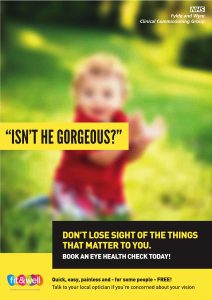People living across the Fylde coast have been urged to get their eyes tested as local healthcare providers launch a new ‘Don’t Lose Sight’ campaign.
NHS Fylde and Wyre Clinical Commissioning Group is promoting this important message for National Eye Health Week, which starts today (MONDAY) and utilises posters urging people not to lose sight of the things that matter to them..
Regular eye tests are important because your eyes don’t usually hurt when something is wrong. A sight test is a vital health check for your eyes that can pick up early signs of eye conditions before you are aware of any symptoms, many of which can be treated if found early enough.
As well as detecting whether you require glasses, or if your current glasses are strong enough, a sight test can pick up early signs of conditions such as diabetes, macular degeneration – which causes a loss of central vision – and glaucoma.
The campaign focuses on the life-changing event which losing sight can be and its impact, such as meaning personal milestones in life may not be the happy memories they should be.
Peter Tinson, chief operating officer at Fylde and Wyre CCG, said: “People can go for years without getting their eyes tested and not realise that they do indeed need glasses.
“They may also be living with a condition such as glaucoma and be unaware, yet if it is picked up early enough it can be treated.
“Loss of sight can be a life-changing event impacting on the most routine things most of us take for granted on a daily basis, such as getting dressed, preparing meals, or driving a car.
“Getting an eye test takes a matter of minutes but the long-term benefits can last a lifetime and be truly life changing.”
Carol Gradwell, a member of the Fylde and Wyre CCG patient and public engagement group who is nearly blind and is part of the Fylde coast Low Vision Committee, said: “I am pleased to see local NHS organisations on the Fylde coast helping to raise awareness of this important issue.
“I will never understand why people put off getting their eyes tested when it can pick up the early signs of conditions that can cause you to go blind.
“It is a huge risk for people to take and, if they don’t get one and it becomes too late, there is no turning back at all.”
National Eye Health Week by Vision Matters runs from today until Sunday to promote the importance of eye health and the need for regular sight tests for all.
The Don’t Lose Sight campaign has been successful in the past when it was first launched under the ‘Altogether Now’ programme in Blackpool, when the posters were first produced.
Eye health checks are quick, easy, painless and – for some people – free. Find out more about eyecare entitlement at NHS Choices on www.nhs.uk.
There are a number of proactive steps people can take to look after eye health and prevent the likelihood of developing conditions such as glaucoma, macular degeneration or cataracts.
- Give up smoking; smokers are much more likely to develop age-related macular degeneration and cataracts compared to non-smokers.
- Get moving; while it might seem odd that exercise can help the eyes, it can be important. Research shows that exercise may reduce the risk of sight loss which can occur from high blood pressure, diabetes and narrowing of the arteries.
- Eat healthily; a healthy balanced diet with a wide variety of fruit and vegetables will benefit your overall health and may help to keep the retina healthy.
- Drink within the recommended limits; heavy alcohol consumption is associated with an increased risk of early age-related macular degeneration.
- Protect eyes from the sun; never look at the sun directly, doing so can cause irreversible damage. Wearing a wide-brimmed hat or sunglasses can help to protect your eyes from the sun’s damaging UV rays.
- People of any age can develop sight problems, but some have a higher risk of eye disease.
It is especially important to have regular eye tests if you are:
- Above 60 years old
- From certain ethnic groups; for example people from African-Caribbean communities are at greater risk of developing glaucoma and diabetes, and people from south Asian communities are at greater risk of developing diabetes. Diabetic retinopathy, where the retina becomes damaged, is a common complication of diabetes.
- Someone with a learning disability
- From a family with a history of eye disease.
